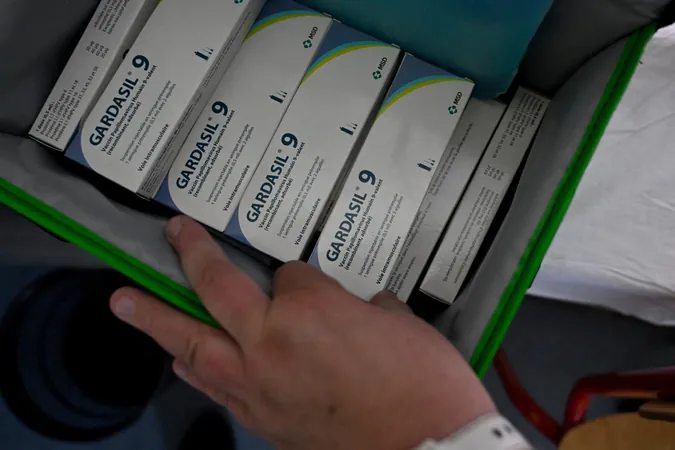
Pakistan Takes Bold Step: Launching Historic HPV Vaccination Drive for Girls
2025-09-03
Author: Arjun
A Groundbreaking Initiative in Women's Health
ISLAMABAD – In a monumental stride for public health, Pakistan is set to kick off its first-ever HPV vaccination drive, targeting girls aged 9 to 14. This initiative, aimed at preventing cervical cancer, offers hope to millions as it addresses a leading cause of cancer-related deaths among women globally, particularly in low and middle-income countries.
Cervical Cancer: A Preventable Disease
Cervical cancer accounts for the fourth most cancer deaths in women worldwide, with a staggering number arising from infections of the human papillomavirus (HPV). Astoundingly, almost all cervical cancers can be prevented with early detection and vaccination. The country's launch of this vaccination drive comes at a critical time, aiming to shield young girls from a disease that could severely affect their future.
HPV Vaccines: A Proven Solution
The HPV vaccine, initially approved by the FDA in 2006, has demonstrated impressive results in reducing cervical cancer rates. Studies showed a dramatic decline of 56% in vaccine-type HPV prevalence among vaccinated girls aged 14 to 19. Following the WHO's global strategy initiated in 2020 to eliminate cervical cancer as a public health issue, many countries—including those with large populations—introduced the vaccine into their national programs.
Training Health Workers for Success
The WHO is collaborating with Pakistan's government to train over 49,000 health workers for this historic initiative, which runs from September 15 to 27. With plans to vaccinate approximately 13 million girls across Punjab, Sindh, Islamabad, and Azad Jammu and Kashmir, the campaign is more than just a vaccination drive; it's about creating a sustainable health care model.
Aiming High: The Goals of the Campaign
In Sindh alone, the government aims to vaccinate about four million girls. This ambitious campaign will take place in schools and community outreach programs, ensuring no girl is left unvaccinated. The vaccines will be provided free of charge through the Expanded Programme on Immunisation (EPI) thanks to support from global health alliances like Gavi.
Changing the Game for Young Women
Dr. Muslima Ejaz, an infectious diseases epidemiologist, emphasizes the significance of targeting adolescents. By vaccinating girls before they are exposed to HPV, the campaign safeguards their health and sets an example for potential future initiatives across Pakistan.
Overcoming Vaccine Hesitancy
Despite challenges such as vaccine skepticism, experts believe that proper communication and education can help alleviate concerns. Health workers play a crucial role in building trust, explaining the benefits of vaccination, and promoting preventive measures against cervical cancer.
A Comprehensive Approach to Women's Health
Beyond vaccinations, gynecologists stress the importance of cervical cancer screening for early detection. Simple tests like pap smears can identify precancerous changes long before cervical cancer develops, highlighting the need for comprehensive healthcare.
The Road Ahead: Strategies for Implementation
To ensure successful vaccine delivery, the campaign will utilize a multi-faceted approach, including fixed vaccination sites and mobile teams to reach communities. School involvement and teacher training will be pivotal, ensuring that young girls access this life-saving vaccine.
Tackling Misinformation and Myths
Health experts warn that misinformation surrounding vaccines, particularly myths about infertility linked to the HPV vaccine, might pose a challenge. However, with accurate messaging, health authorities have a unique opportunity to educate the public and promote the vaccine's benefits.
A Bright Future for Women in Pakistan
Cervical cancer affects over 5,000 women annually in Pakistan, but with this vaccination drive, a remarkable change is on the horizon. By successfully launching this program, Pakistan could not only reduce its cervical cancer rates but also set a precedent for future health initiatives aimed at protecting women's health.



 Brasil (PT)
Brasil (PT)
 Canada (EN)
Canada (EN)
 Chile (ES)
Chile (ES)
 Česko (CS)
Česko (CS)
 대한민국 (KO)
대한민국 (KO)
 España (ES)
España (ES)
 France (FR)
France (FR)
 Hong Kong (EN)
Hong Kong (EN)
 Italia (IT)
Italia (IT)
 日本 (JA)
日本 (JA)
 Magyarország (HU)
Magyarország (HU)
 Norge (NO)
Norge (NO)
 Polska (PL)
Polska (PL)
 Schweiz (DE)
Schweiz (DE)
 Singapore (EN)
Singapore (EN)
 Sverige (SV)
Sverige (SV)
 Suomi (FI)
Suomi (FI)
 Türkiye (TR)
Türkiye (TR)
 الإمارات العربية المتحدة (AR)
الإمارات العربية المتحدة (AR)